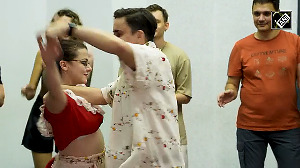A US court on Monday rejected Pakistan born Canadian Tahawwur Rana's plea for a new trial in cases related to the Mumbai and Denmark terror plots, saying there is no reason to believe the court erred in convicting David Headley's co-accused for aiding Lashkar-e-Tayiba.
A district court said the defendant had failed to demonstrate that the court erred and a new trial is warranted, and that the government has presented substantial evidence of defendant's knowledge and participation in the acts.
In June last year, after a three-week trial, 50-year-old Rana was convicted of providing material support to the banned LeT, and of conspiracy to provide material support to terrorism in connection with a foiled plot involving Danish newspaper Jyllands Posten.
He was, however, acquitted of charges that he aided the terrorists who carried out the 26/11 attacks in Mumbai.
Rana had appealed for a new trial in September last year citing that the jury was confused and that he did not get a fair trial.
According to documents released by the US district court of the Northern District of Illinois, the court applied the correct legal standard, considering the totality of the evidence and properly denied the motion to quash.
The documents said that the court correctly concluded that, even considering Headley's statements, probable cause existed.
The court particularly noted a September, 2009 conversation in which Rana and Headley discussed Denmark as a "target" and said there was significant evidence regarding the defendant's knowledge and actions.
In denying the motion, the court pointed to at least three recorded conversations in which Rana was a participant, his involvement with Headley's travel to Copenhagen and his attempts to get Headley a visa.
The documents said that in his final argument, Rana concludes "without the support of law or fact" that the district court erred by ruling against him.
However, the defendant fails to offer a single citation or any explanation for how the court allegedly erred, said the court.
The defendant's "argument is waived because he provides no authority indicating that the district court erred".
In fact, it said, the defendant's list of errors is so cursory that the government has no meaningful ability to respond.
"In arguing that the government failed to prove its specific allegations, the defendant Rana simply rehashes his sufficiency of the evidence argument," the court said.
Among other arguments, defendant argues that he lacked knowledge of Headley's true activities, and thus neither he nor Headley constituted "personnel".
As discussed at length above, the government presented substantial evidence of defendant's knowledge and participation, it said.
Thus, the evidence demonstrated that defendant had provided both himself and Headley as "personnel," and that defendant "concealed" the nature of such support.
Based on this evidence, a rational tier of fact could have, and did, find "the essential elements of the crime beyond a reasonable doubt," the court concluded holding that Rana's argument was without merit.
"Because the government need only have proven that defendant conspired to, or did, provide one form of material support, the government need not address defendant's arguments about other forms of material support for purposes of this motion.
"The government, however, submits that the evidence demonstrated each of the forms of material support alleged in the Second Superseding Indictment and Bill of Particulars".







 © 2025 Rediff.com -
© 2025 Rediff.com -